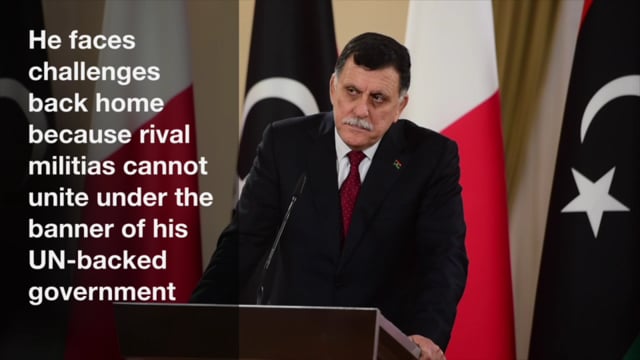Powerless Serraj appeals to rivals to join bid for united Libya
LIbyan PM Fayez Serraj, Joseph Muscat urge rival Libyan factions to seek common ground for united Libya under his Government of National Accord


Libya’s UN-backed president Fayez Serraj and Malta’s Prime Minister Joseph Muscat have urged all Libyan factions to get around the negotiating table to reach a consensus for a united Libya under Serraj’s stewardship.
Addressing a press conference at Castille following bilateral talks, Muscat said that Malta unequivocally recognized Serraj’s UN-backed Government of National Accord as the legitimate Libyan government, but that it “will not rest solely on formal recognition”.
“Wherever we have influence, we will use it to let it be known that a space exists for everyone within the political agreement that set up Serraj’s government,” he said.
Serraj urged all Libyan factions to put their differences aside to unite against terrorism, which he described as a common enemy. “We are reaching out to all parties in Libya, and doing all we can to reach a common ground. We believe that the political agreement is the ground upon which to build consensus, and oppose any escalation of conflict.”
Serraj’s legitimacy has been rocked after being unable to bring together rival militias under his government’s banner. In September, Field Marshall Khalifa Haftar, commander of the army of the House of Representatives (HOR) parliament in eastern Libya, which does not cooperate with the GNA, captured four key central oil ports from the Petroleum Facilities Guard, a militia aligned with the GNA.
Serraj is also entangled in a public row with the governor of the Central Bank of Libya, Sadiq Al Kabir, blaming him in late October for not releasing hard currency to the government.
Having lost control of the bulk of Libya’s oil, and with the Central Bank refusing to release funds, the GNA’s inability to control Tripoli has raised question marks about its credibility.
Serraj said today that he doesn’t want to exclude any military leaders from a peace deal but insisted that the military must be restructured so that it falls under the power of the GNA.
Muscat refused to state whether Malta has taken a stance towards Haftar, only saying that it is up to the Libyans to decide what role they want got him and the army.
“We appreciate the argument that there needs to be civil oversight on military personnel, but it is up to Libyans to decide upon the structures, while our role is to bring the parties around the same table as often as possible.”
Muscat said that Malta will push for Mediterranean security to be prioritized during the country’s upcoming stint as head of the EU rotating presidency.
“The discussion shouldn’t simply revolve around migration, but also focus on economic development, security and border control.
“We have found a lot of common ground and goodwill from Serraj and his government, and look forward in the next few months to ensuring that our European friends family appreciates the situation in Libya, and plays a positive and proactive role to ensure progress in the country.”








.jpg)




.jpg)






.png)


